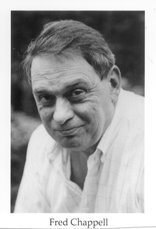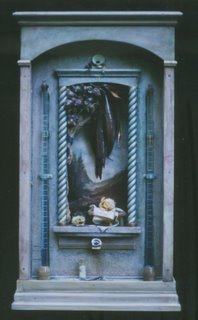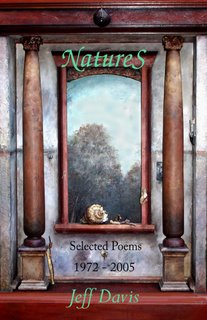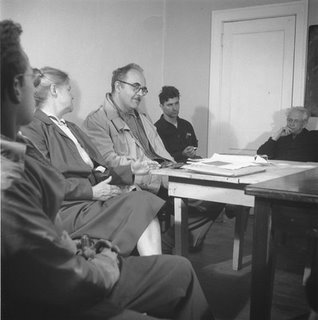Jaye Bartell: Another Flight
Sketch: Tennessee Dawn
hanging over
the Holston
moon
still there
at dawn
after
evening
dawn
tucked in
mountainsover the Holston
River
Labels: Jaye Bartell, poets
Maps of Poetry and the Surrounding Territories
Sketch: Tennessee Dawn
hanging over
the Holston
moon
still there
at dawn
after
evening
dawn
tucked in
mountainsover the Holston
River
Labels: Jaye Bartell, poets
 By the time you're sixty (or thirty, for that matter) there've likely been occasions when, despite the clearest intentions pursued with focused energy, you've found yourself in a place other than one you intended to reach. There's an unanticipated turn in the path, and you have no option but to take it, regardless, and see where you wind up. One such turn for me involved North Carolina writer Fred Chappell, and because of it, there's a sense in which I owe him real debt of gratitude.
By the time you're sixty (or thirty, for that matter) there've likely been occasions when, despite the clearest intentions pursued with focused energy, you've found yourself in a place other than one you intended to reach. There's an unanticipated turn in the path, and you have no option but to take it, regardless, and see where you wind up. One such turn for me involved North Carolina writer Fred Chappell, and because of it, there's a sense in which I owe him real debt of gratitude.Labels: Buffalo, Fred Chappell, poets
 Today at 8:21 AM EDT the axial tilt of Earth that produces our seasons brought the Sun to its northern zenith, and so gave us Solstice, the point at which the Sun, Sol, appears to pause before it gradually retreats toward the south, bringing us once again autumn and winter, and Persephone returned once again to the depths of the Underworld. For now, though, She's here among us. It's been a moment to celebrate for millenia.
Today at 8:21 AM EDT the axial tilt of Earth that produces our seasons brought the Sun to its northern zenith, and so gave us Solstice, the point at which the Sun, Sol, appears to pause before it gradually retreats toward the south, bringing us once again autumn and winter, and Persephone returned once again to the depths of the Underworld. For now, though, She's here among us. It's been a moment to celebrate for millenia.
It is important for the human race to spread out into space for the survival of the species. Life on Earth is at the ever-increasing risk of being wiped out by a disaster, such as sudden global warming, nuclear war, a genetically engineered virus or other dangers we have not yet thought of.
Labels: readings
 Tomorrow evening I'll be reading from NatureS over in Sylva, at the wonderful City Lights bookstore; I'd have had a note up earlier, but Blogger has been down more-or-less constantly for days - as you probably know, if you read Atrios or Digby or ... a host of others, as many have mentioned it. Argh.
Tomorrow evening I'll be reading from NatureS over in Sylva, at the wonderful City Lights bookstore; I'd have had a note up earlier, but Blogger has been down more-or-less constantly for days - as you probably know, if you read Atrios or Digby or ... a host of others, as many have mentioned it. Argh.That's lightly edited; City Lights originally had Joyce Blunk attending also, but she has family in town and won't be able to make it. And they'd promoted me to associate professor, which I wasn't. I'm not so sure about that "renaissance man" thing, but thanks anyway. And since they mention Fred Chappell, I suppose I'll have to tell my Fred story. Fred, in an oblique way, actually made it possible for me to go to Buffalo and study with Robert Creeley, and others, though I'm sure that's not what he had in mind.
(Fri. 6/9) Poetry Reading with Jeff Davis
~~~~~~~~~~~~~~~~~~~~~~~~~~~~~~~~~~~~~~~~~~
Please join us on Friday, June 9 at 7:30 p.m. for a reading and booksigning with poet Jeff Davis. A long- time resident of Asheville, Davis will be celebrating the publication of his selected poems, NatureS, which is being published by Thomas Rain Crowe's New Native Press in Cullowhee. Area residents perhaps know Davis from his thoughtful articles as a features writer for Rapid River and for his role as one of the hosts for the WPVM radio show 'WordPlay'. A renaissance man, he studied with Fred Chappell and Robert Creeley, and has also taught at UNC-A as assistant professor of Anthropology, worked as a baker and photographer, and founded a computer programming and trouble-shooting business. The poems in NatureS were written over the course of a career, and are love poems to and of nature, to and of flesh. The many natures of what we, as humans, are, as well as what we strive for, wish for and dream of. Davis's poems in this collection are place-specific to the western North Carolina mountains, their fauna and flora, their cultures and seasons. Commenting on Davis's new book, western North Carolina's own Jonathan Williams has written: "I divide poetry into what I can read and what I cannot read. I am new to Jeff Davis's work but hit'll read!!! It reminds me that writers named Robert Creeley and Charles Olson once taught at Black Mountain College in Buncombe County, NC - and made a difference."
The June 9th event will include a formal reading by Davis followed by refreshments and an opportunity for those in attendance to meet and talk to the author and to buy signed copies of the new book. The evening is free and open to the public.


Labels: Charles Olson, poets, Ron Silliman